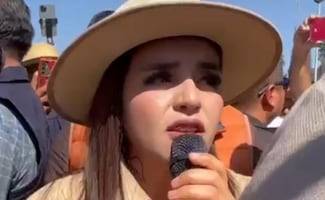Más Información

Auditoría Superior confirma presuntos actos de corrupción en el INAI; detecta turismo de comisionados y contratos irregulares

Fiscalía de Zacatecas confirma que Ángela Aguilar y Christian Nodal presenciaron enfrentamiento armado; "ellos no fueron el blanco", aclara

Grecia Quiroz presenta denuncia contra Leonel Godoy, Raúl Morón e Ignacio Campos; los acusa de participar en asesinato de Carlos Manzo
As Turkish troops finalize plans to attack northeast Syria , Ankara’s scheme to move millions of refugees into conquered territory there is alarming some Western allies as much as the military operation itself.
Addressing world leaders at the United Nations two weeks ago, President Tayyip Erdogan held up a map of the region setting out ambitious proposals to build dozens of new villages and towns to settle Syrian refugees .
His map showed that 1 million Syrians would be housed in the northeast, but Erdogan told the U.N. General Assembly that even more— up to 2 million — refugees could settle there once Turkish soldiers take control.
For Turkey , which hosts more refugees than any other country in the world , returning some Syrians across the border has become an urgent priority as it battles economic recession and high unemployment.
But most of the 3.6 million Syrians in Turkey are from Sunni Arab areas in western Syria , not the mainly Kurdish northeast. Moving huge numbers of refugees into an area hundreds of miles from their homes would involve a drastic demographic shift.
Reports in July of some refugees being forcibly deported from Istanbul have raised concerns about any large-scale returns. Turkey says it has not sent any Syrians back against their will.
Czech Foreign Minister Tomas Petricek
, voicing widely-held European concerns, said Syrian refugees should be able to return voluntarily . “I don’t think, however, that they should be returned by any military operation, Turkish or otherwise,” he said.
A European diplomat said the European Union , which has disbursed most of a EUR€ 6 billion aid package to help Turkey host refugees on its soil , would also look skeptically at any request for funding projects inside Syria before any political settlement is reached to end its eight-year conflict.
Ankara has dismissed the concerns about the impact of a return of refugees from Turkey, saying any change to the population would only be redressing moves by the Kurdish forces which currently control the region .
“Turkey ... has no interest in occupation or changing demographics. The PKK/YPG did that in northeast Syria. Time to correct it,” Erdogan’s spokesman Ibrahim Kalin tweeted.
For Ankara , which views Kurdish YPG fighters in northeast Syria as terrorists because of their ties to militants waging an insurgency inside Turkey, an influx of non-Kurdish Syrians would help it secure a buffer against its main security threat.
Other areas of Syria have seen drastic population changes, with rebellious Sunni neighborhoods of Homs and Damascus emptied by the fighting . Villages in northern and western Syria have seen deals to evacuate Sunni and Shi’ite residents.
Before heading to the United Nations last month, Erdogan said that the Turkish-controlled zone “ will both allow the refugees we have to return to their lands , and allow for all their needs , from education, health, shelter to be met.
“ It will allow them to live on their own lands (instead of) the tent towns and container cities,” he said.
He later said the number of Syrians returning could rise to 3 million if Turkey’s incursion went beyond the 20 mile ( 32 km ) “ safe zone ” it plans to establish inside northeast Syria.
Turkey has already launched two military incursions in Syria’s northwest
and says those operations showed it can restore services and infrastructure to areas devastated by war.
“ In the safe zones we create , we have made sure the conditions to live like humans are met and will continue to do so ,” Vice President Fuat Oktay said on Tuesday.
He said Turkey had brought security , health , education , shelter , roads , water , and electricity , allowing 370,000 Syrian refugees to return.
Erdogan made no mention of the cost of his plans for northeast Syria , but state broadcaster TRT gave a figure of TRY₺ 151 billion ( USD$27 billion ).
sg
Noticias según tus intereses
[Publicidad]
[Publicidad]











